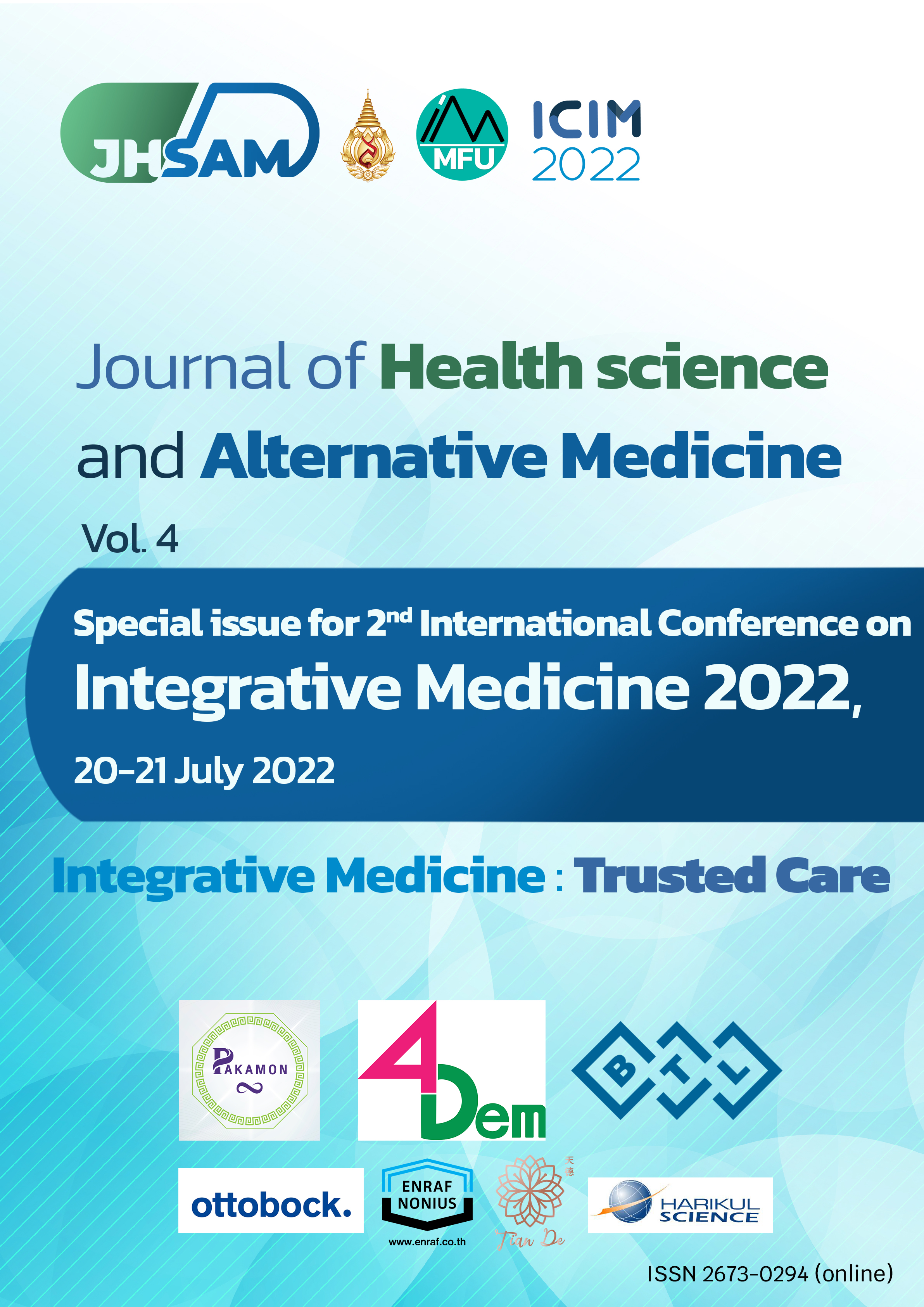C31. Traditional Chinese Medicine in Treating Depression
Main Article Content
Abstract
Depression is a mental health disease that causes patients to be in a negative emotional situation. It is a psychosomatic disease that is difficult to recover from and has a high recrudescence rate. Much research and clinical results showed that Traditional Chinese Medicine (TCM) is effective in depression and can reduce the symptoms. A depression patient with depression came for acupuncture treatment. After four acupuncture treatments, the emotion turned more positive, and symptoms such as insomnia, poor appetite, body pain, etc., had reduced. These cases showed that TCM is an effective and alternative option for depression.
Article Details

This work is licensed under a Creative Commons Attribution-NonCommercial-NoDerivatives 4.0 International License.
JHSAM publishes all articles in full open access, meaning unlimited use and reuse of articles with appropriate credit to the authors.
All our articles are published under a Creative Commons "CC-BY-NC-ND 4.0". License which permits use, distribution and reproduction in any medium,
provided that the original work is properly cited and is used for noncommercial purposes.
References
World Health Organization, Depression, https://www.who.int/news-room/fact-sheets/detail/depression.
Schmidt P.J. Mood, depression, and reproductive hormones in the menopausal transit. The American Journal of Medicine, 2005, 118(12B),54-58
Rashid T., Haider I. Life events and depression. Annals of Punjab Medical College, 2008, 2(1): 11-16
Mata D.A., Ramos M.A., Bansal N., Khan R., Guille C., et al. Prevalence of depression and depressive symptoms among resident physicians: a systematic review and meta-analysis. JAMA. 2015, 314(22): 2373-2383.
Intstitute of Health Metrics and Evaluation. Global Health Data Ecxchange (GHDx). http://ghdx.healthdata.org/gbd-results-tool?params=gbd-api-2019-permalink/d780dffbe8a381b25e1416884959e88b.
Solomon A. Opinion our great depression. The New Yorks Times, 2019.
Agence France-Presse. Depression is leading cause of disability worldwide, says WHO study. The Guardian, 2019.
World Health Organization Regional Office for Soulth-East Asia. Mental Health Status of Adolescents in South-East Asia: Evidence for Action, 2017, https://apps.who.int/iris/bitstream/handle/10665/254982/9789290225737-eng.pdf?sequence=1.
Zhang Bo Li, Wu Mian Hua, et al. Zhong Yi Nei Ke Xue. China Press of Traditional Chinese Medicine Co., Ltd. 2017: 289-295
Tang Qi Sheng. Diagnostic criteria and treatment plan of TCM syndromes of depression. Journal of Beijing University of Traditional Chinese Medicine, 2011, 34(12): 810-811.
Jing Cheng Hui, Gao Chang Yu. The usage characteristics of traditional Chinese Medicine for treating depression in publicly available patents based on data mining analysis. Journal of Shanxi University of Chinese Medicine. 2007, 22(06): 401-404.
Wen Yu Kun, Chen Chun Mei, Zhang Fu Li. Review of treatment of depression with Wendan Decoction. Jiangsu Journal of Traditional Chinese Medicine, 2021, 53(12): 74-77.
Ren Si Qi, Zhao Feng, Yu He Ming. Research progress of Xiao Yao San in the treatment of depression. Acta Chinese Medicine and Pharmacology, 2021, 49(04): 112-116.
Tang Li Juan, Tan Yong An, Pan Hai Zhen, et al. Clinical observation of Wendan Decoction and Dingzhi Pill combined with Deanxit in the treatment of depression. World Latest Medicine Information. 2019, 19(37): 201
Yin Yi, Zhu Cun Cheng. Effect of Chaiihu Wendan Decoction combined with western Medicine on non-erosive gastroesophageal reflux disease combined with anxiety depression and its effect on autonomic nerve function. Liaoning Journal of Traditional Chinese Medicine, 2020,47(08): 97-99
Zhang Qing, Shen Li. Bibliometric analysis of acupuncture and moxibustion in the treatment of depression. Hunan Journal of Traditional Chinese Medicine, 2022, 38(02): 114-119
Ma Lan Ping. General situation of acupuncture and moxibustion treatment of depression in recent years. Chinese Acupuncture and Moxibustion, 2006, 26(S1): 118-120
Lv Mei, Wang Ling Ling, Analysis of the frequency of acupoint selection in the treatment of depression with acupuncture and moxibustion. Journal of Clinical Acupuncture and Moxibustion, 2003, 19(8): 15
Sun Zhao Yang, Shan Xin Jue, Huang Xiao Yuan, et al. Visual analysis of literature knowledge structure and acupoint matching rules of acupuncture for depression. Chinese Acupuncture and Moxibustion. 2021, 41(09): 1049-1054
Zhang Han, Zhao Meng Yun. Exploration of ghost points. China Journal of Traditional Chinese Medicine and Pharmacy, 2016, 31(10): 4162-4163
Jiang Cui, Cui Jia Li, Deng Zhu Qing. Comments on the clinical application of 13 ghost points. Guiding Journal of Traditional Chinese Medicine and Pharmacy, 2010, 16(02): 1-3.
Jian Lv, Changzheng Shi, Yanjia Deng, et al. The brain effects of laser acupuncture at thirteen ghost acupoints in healthy individuals: A resting-state functional MRI investigation. Computerized Medical Imaging and Graphics, 2016, http://dx/doi.org/10.1016/j.compmedimag.2016.08.003.
Qin Wei Xun, Lai Ming Yin, Huang Tan Ru, Deng Gan. A study on Yuan Qing's clinical experience in using Guiku acupoint to regulate the emotion. New Chinese Medicine, 2016, 48(12): 159-161.
Li Guo Cheng, Li Li. Moxibustion on Guiku points for treatment of depression. Shanghai Journal of Acupuncture and Moxibustion, 2004, (06): 46.
Qian Nan, Yi Wei Min, Clinical treatment observation on Shao Shang, Yin Bai moxibustion for phlegm qi stagnation type of depression. Journal of Shan Xi Traditional Chinese Medicine, 2005, 21(5): 39-40
Yao Zeng Yu, Zhang Zhi Nan, Cai Xiao Wen, Huang Yong. Thoughts on acupuncture and moxibustion in treating emotional disease. Henan Traditional Chinese Medicine, 2019, 39(12): 1901-1905.
Huang Li, Wang Dong Yi, Zhao Yan Qing. Knowledge atlas analysis of acupuncture and moxibustion in the treatment of insomnia. World Chinese Medicine, 2021, 16(22): 3404-3408.
Xiao Shi Ju, Ji Yun Run, Xian Fu Yang, Zhang Guang Zhong. Study on the relationship between the gut brin theory and the theory of TCM of "Worry Impairing Spleen". Jilin Journal of Chinese Medicine, 2019, 39(09): 1128-1131.
Li Zi Ming, Chen Jian Yi, Sun Shuang, Ming Rui Kang, Wu Song. Brief analysis on pivot effect of Tianshu (ST 25). Chinese Acupuncture and Moxibustion, 2020, 40(12): 1319-1321.
Wang Jia Ning, Hou Shuai, Zheng Shen, Chen Sha Sha. Simple discussion about treatment of syndrome of Liver-qi Stagnation by "Open Four Gates". Journal of Chengdu University of Traditional Chinese Medicine, 2017, 40(04): 92-95.


